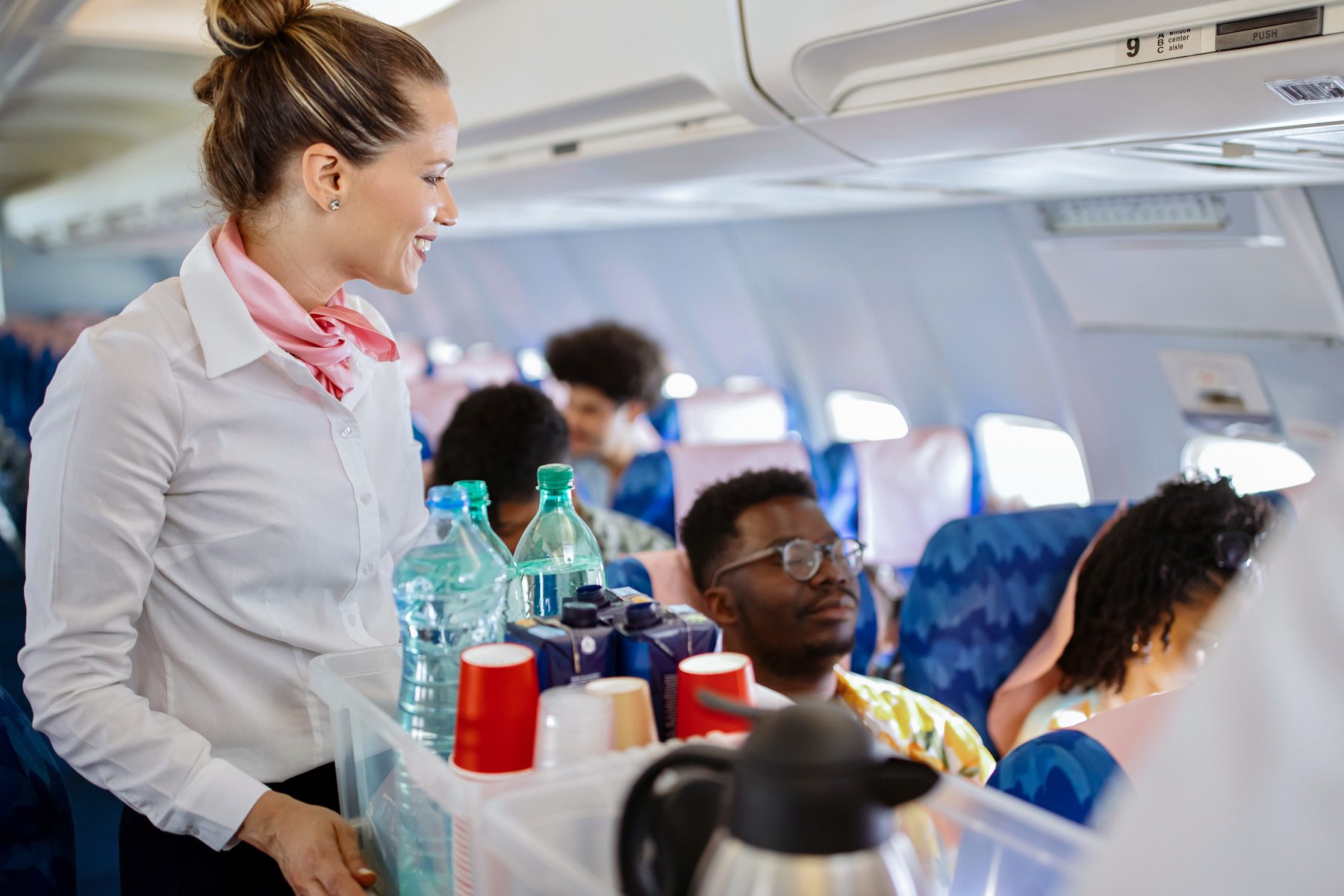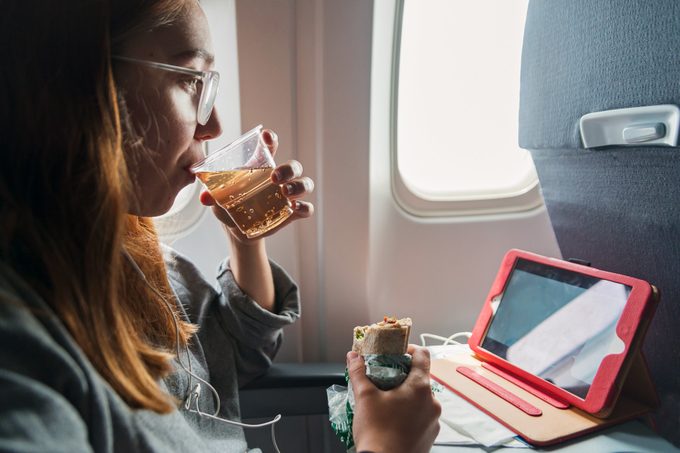Spoiler alert: It's a childhood favorite!

This Is the One Drink You Should Always Order on a Flight

Frequent fliers know how important it is to stay hydrated while traveling, but you might be wondering which beverage is the safest bet. After all, you know to avoid coffee and tea in the sky since airplane tap water can contain nasty bacteria. You probably skip the mystery “pitcher water” the flight attendants bring around for the same reason.
So what is an ideal plane potable from a taste and health perspective? We noticed a certain childhood favorite kept popping up on Reddit threads and TikTok videos as a flight essential, so we investigated. In the interest of vetting this unexpected airplane-travel tip, we checked in with Angel Luk, RD, a registered dietitian in Richmond, British Columbia, and the founder of FoodMysteries.com. Read on for the surprise pick that may just have you switching your order the next time you fly.
Get Reader’s Digest’s Read Up newsletter for more travel, tech, cleaning, humor and fun facts all week long.
What’s the best drink to order on a flight?
Surprise: It just might be ginger ale, the fizzy favorite of Reddit posters. What makes it surprising is that many people report they crave this soft drink only in the air—not in normal life. So why does ginger ale please the palate on a flight but not on solid ground? There’s actually a scientific explanation for this weird phenomenon: Foods and drinks taste different on a plane.
One wild reason is that background noise alters how things taste. Yes, really.
Here’s the deal: A study by Cornell University researchers discovered that our taste buds perceive certain flavors differently under noisy conditions. In the study, which was published in the Journal of Experimental Psychology: Human Perception and Performance, people tasted salty, sweet, sour and umami flavors both with ambient noise at the decibel level of a typical aircraft cabin (80 to 85 decibels) and without the noise. As it turned out, umami tasted more pronounced, and sweet seemed milder, under noisy conditions.
The findings may help explain why ginger ale is so popular in the sky: Amid the noise of the aircraft, the drink’s complex ginger umami hint comes out, while its sweetness recedes, so it doesn’t taste overly sugary.
On top of that, high altitudes may make us crave sweet flavors. A study that tested taste preference after three weeks at 3,500 meters found that high altitude led to an increased palatability for sweetness. Though the study is older, it provides another possible reason so many travelers crave soda while flying.
Why else is it good to have ginger ale on a plane?

The real health benefit of ginger ale is that it helps keep you hydrated. That’s key when flying, since the low humidity in a plane cabin makes it easier to get dehydrated. It doesn’t help that many of us make the mistake of limiting our fluids during air travel to avoid having to use the (gross) airplane bathroom, Luk says.
“It’s very important to stay hydrated in the air,” she says. “Dehydration can lead to headache, dizziness, weakness, high heart rate and low blood pressure.”
Is ginger ale a cure for motion sickness?
Ginger itself is an ancient remedy for a reason: It contains compounds that may ease gastrointestinal issues, including motion sickness, according to Mount Sinai hospital in New York. Keep in mind, though, that ginger ale may not pack enough of the root to do the (gut-soothing) job. “Ginger ale often has very little actual ginger,” Luk notes.
Some brands have no ginger at all. And the brands you’re most likely to see on airplanes have minuscule amounts. Schweppes simply includes “natural flavors,” and Canada Dry contains only a small amount of ginger extract, according to the brand.
So why do many people swear it’s the drink to get for soothing motion sickness and other tummy issues? It could be partly due to the placebo effect.
In addition, ginger ale is free of caffeine, which makes it gut-friendly. Caffeine stimulates acid production in the gut, and regularly downing caffeinated drinks has been linked to reflux. So if you’re prone to travel-related tummy issues, avoiding caffeinated sodas like Diet Coke on a plane is a smart move.
Should I drink my ginger ale with ice?
No. Whatever you do, don’t ask for ice in your drinks when flying. Here’s why the no-ice rule is a golden rule: Airplane ice is often contaminated. Wait until you’re on solid ground to enjoy your ginger drink on the rocks.
So is ginger ale good for you?
Since it’s hydrating, ginger ale has a health purpose. Another plus: no caffeine. “It’s a nice alternative to the caffeinated options on the plane, such as regular cola, coffee and tea, that may interrupt your sleep cycle even more than jet lag might,” Luk adds.
But like all sodas, ginger ale is high in sugar (around 33 grams in one can), so it’s not a great go-to option. That also makes it a bad pick for people with diabetes who don’t want to raise their blood-sugar levels.
But as a once-in-awhile treat—say, up in the sky? As long as you’re otherwise healthy, it is fine, says Luk.
About the expert
|
Why trust us
Reader’s Digest has published hundreds of travel stories that help readers explore the world safely, easily and affordably. We regularly cover topics such as the best places to visit (and the best times to visit them), tips and tricks to zoom through airport security, flight-attendant secrets, hotel-room hacks and more. We’re committed to producing high-quality content by writers with expertise and experience in their field in consultation with relevant, qualified experts. We rely on reputable primary sources, including government and professional organizations and academic institutions as well as our writers’ personal experiences where appropriate. We verify all facts and data, back them with credible sourcing and revisit them over time to ensure they remain accurate and up to date. For this piece, Lisa Lombardi tapped her experience as a longtime health reporter and the author of What the Yuck?! The Freaky and Fabulous Truth About Your Body to ensure that all information is accurate and offers the best possible advice to readers. Read more about our team, our contributors and our editorial policies.
Sources:
- Angel Luk, RD, registered dietitian, founder of FoodMysteries.com and author of You Can’t Out-Train a Bad Diet; email interview, Oct. 17, 2024
- Reddit: “Who else also drinks ginger ale when they fly?”
- Journal of Experimental Psychology: “A Crossmodal Role for Audition in Taste Perception”
- PubMed: “High altitude effects on human taste intensity and hedonics”
- Mount Sinai: “Ginger”
- Clinical Gastroenterology and Hepatology: “Association Between Beverage Intake and Incidence of Gastroesophageal Reflux Symptoms”























